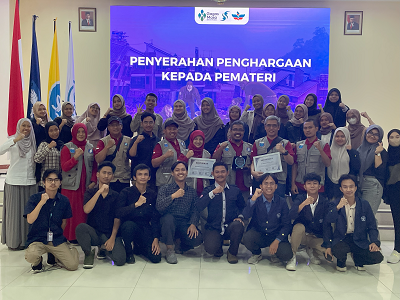Gen Z Learns Disaster Management with ARM HA IPB University

IPB University Student Volunteers under the auspices of the Student Executive Board of the Student Family (BEM KM) in collaboration with the Alumni Association Independent Volunteer Action (ARM HA) held a Disaster Training themed 'The Role of Gen Z as a Catalyst for the Development of Emergency Response Awareness and Disaster Mitigation'.
The training aims to improve the abilities and skills of students, who fall into the Generation Z category, in recognising the potential and occurrence of disasters and how to handle them through understanding the disaster management cycle. In addition, participants were also encouraged to increase their sense of sensitivity to daily disaster issues in their environment. The training was attended by 42 participants from various faculties within IPB University.
The day before, Saturday (22/7), a webinar with a similar theme was also held by IPB University Student Volunteers which featured a guest speaker, Chairman of ARM HA IPB University, Ir Ahmad Husein, MSi.
"We hope that Gen Z will show their social care, especially to those affected by disasters, by learning to understand aspects of disaster management," said Chairman of BEM KM IPB University, Imaduddin Abdurrahman when opening the event.
ARM HA IPB University highly appreciated the activity of introducing the concept of disaster to Gen Z on campus. "Efforts to motivate young people from among Gen Z to become activists, both on campus and in the community in increasing awareness of disaster preparedness and mitigation, are very noble and deserve thumbs up," said Ahmad Husein.
The Head of Volunteer Management of ARM HA IPB University, Ir Agus Susilo JP and five ARM facilitators also guided the participants during the training, including learning the main concepts in disasters including hazard, vulnerability, risk and capacity along with examples through discussions, group work and fun games. They worked in five groups to identify natural disasters that often occur in Indonesia, namely earthquakes, tsunamis, floods, landslides and volcanic eruptions. In addition, they practised following the stages of disaster management, especially the pre-disaster phase (prevention, mitigation, preparedness) and emergency response.
For Rafiqah, an IPB University student from the Department of Sharia Economics, Faculty of Economics and Management, the training was very exciting. "That's because each material is complemented with group discussions and uses many props that make the event varied and interesting," said Rafiqah who is Batch 58.
Her colleague, Aina Zuhda Azimah, agreed. "The materials are very useful, the delivery is accompanied by games so that participants understand more quickly and are active in the activities," said Aina.
Meanwhile, Latif Hidayatul Ikhsan from the Department of Agronomy and Horticulture, Faculty of Agriculture, hopes that his generation can always do good wherever they are. He said, "This disaster training is very good, it gives us awareness as a young generation to realise the disaster conditions in Indonesia." (*/Rz) (IAAS/RUM)



